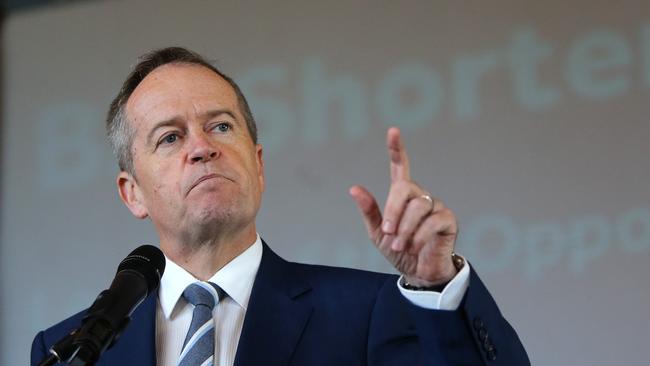Unions pay deal under Bill Shorten leaves workers worse off
EXCLUSIVE: A DEAL struck while Labor leader Bill Shorten was head of the Australian Workers’ Union left employees at one of Australia’s biggest retail chains $2491 a year worse off.

NSW
Don't miss out on the headlines from NSW. Followed categories will be added to My News.
- Shorten’s ‘dodgy’ union wage deal exposed
- OPINION: As Labor gains ground, imagine Bill Shorten Australia
A RAFT of union agreements unearthed by the federal government has robbed workers at some of Australia’s largest companies of up to $1800 a year in penalty rates.
Labor’s aggressive campaign opposing Sunday penalty rate cuts has also been left open to claims of hypocrisy over a deal struck with the Australian Workers’ Union while Bill Shorten was national leader.
Employment Minister Michaelia Cash has accused Mr Shorten of “playing politics” over his promise to restore Sunday penalty rates: “Do you mean for everyone you screwed in the deals you and other unions have done?” she asked.


“The more we delve into it, the more unions have destroyed Sunday penalty rates,” she told The Daily Telegraph.
“The Labor Party is happy for penalty rates to be reduced so long as it is their union masters who are negotiating the deals.”
Labor has repeatedly argued that workers are better off overall under the collective agreements with workers compensated for the loss of penalty rates by higher Monday to Friday rates.
But analysis of deals done with Target, McDonald’s, and KFC among others shows the deals fail to compensate for Sunday penalty rate cuts with higher Monday to Friday hourly rates.
While Opposition Leader Mr Shorten was national secretary at the Australian Workers’ Union, the organisation’s Queensland branch struck a deal with Target that paid workers $47.91 a week less — or $2491 a year — than the Retail Industry Award.
The pay deal, which covered North Queensland workers, expired in 2008, and meant workers on the union deal were paid $1.98 more per day Monday to Friday, but $55.83 less per day on Sunday.
Mr Shorten is away on leave, however his office said there was no record of him personally sighting the deals.
“This is desperate and pathetic from a minister who just two days ago sold out 700,000 workers by supporting cuts to their penalty rates,” a spokesman said.

Sunday penalty rates were reduced by 5 per cent last weekend after a determination by the independent Fair Work Commission.
Mr Shorten has pledged to overturn the ruling should he win office at the next election.
Target said the analysis looked only at base wage rates and Sunday penalties and did not include other allowances and benefits employees received in the agreement.
Under the agreement, Target paid all staff superannuation into the union’s REST industry fund.
The federal government analysis of McDonald’s pay rates Australia wide shows workers were worse off under the agreement negotiated by the Shop Distributive and Allied Employees Association in 2013 compared to the Fast Food Industry Award — the legal safety net.
Employees are paid $12.47 more per day during the week, but $61.41 less per Sunday if they are on the agreement negotiated by the shoppies union. Over a week, an employee working four weekdays and one Sunday would be paid $11.53 less under the union agreement, or $600 a year. If the employee was working two weekdays and one Sunday per week, they would be $36.47 worse off under the union deal, or $1896 a year.
READ MORE
Penalty rate cuts for retail and hospitality workers will help boost jobs
At KFC Tweed Heads, the federal government modelling shows workers are paid $13.30 more per day under the deal negotiated by the AWU and the SDA.
However, Sunday workers receive $60.55 less per day.
According to the analysis, this means a KFC employee working two weekdays and one Sunday earns $33.95 less a week, or $1765 a year.
While a KFC worker rostered on four weekdays and one Sunday each week is paid $7.35 less for the week under the union deal, $382 a year.
Ms Cash said the analysis was the piece of the puzzle that showed workers were not better off under union deals.
Labor’s employment spokesman Brendan O’Connor told ABC radio last week: “I don’t think it’s a contradiction for unions to say we don’t want cuts to penalty rates in awards, and to negotiate on agreements which compensate people for changes to penalty rates.”
Labor’s assistant workplace relations spokeswoman Lisa Chesters said workers could be better off overall under Fair Work Commission benchmarks despite lower Sunday rates.

“We have members of the government saying in here and publicly, ‘How dare McDonald’s pay less on a Sunday than a small takeaway shop down the road’. What they fail to tell the Australian people is that McDonald’s has a collective agreement that is better off overall against the award,” she said.
ACTU president Ged Kearney said earlier this year: “I know in some nursing bargaining ... nurses chose to reduce their Sunday penalty rates, but the pay-off was an increase in evening penalty rates ... my point is that you get something in return, and the workers vote.”
No penalty for cafe as Sunday pay rates cut
THERE’S no such thing as “easy like a Sunday morning” when you’re running a cafe.
Cafe Cedro manager Lisa Wilson on the state’s mid north coast understands why the Fair Work Commission’s decision to cut Sunday penalty rates will make life easier for small business owners. Ms Wilson said it would give owners the opportunity to hire more workers and grow their business, given the high cost of paying staff on the weekend.
Ms Wilson, who was unsure of how the penalty rate changes would affect Cafe Cedro, said any cuts to wages could help small businesses employ more staff or roster more hours across the week.

Ms Wilson said small business was a driver of the economy and needed to be supported with wage adjustments.
“Small business is a really important part of the Port Macquarie economy, so we need them to stay open.”
She said cheaper rates on Sundays made trade easier.
“It makes it easier to stay open and it gives the possibility to hire more staff,” she said.
The changes, which began at the weekend, will eventually mean full-time and part-time hospitality employees will have their penalty rates cut from 175 per cent to 150 per cent. The rate for casual staff will remain the same at 175 per cent. Under the first phase of the cuts workers lost up to 5 per cent of their wage.
Cafe Cedro employee Chelsea Trappett, 18, started working at the business in January and said she was happy to do Sundays or any other day.
“I just work here whenever I can,” she said.
“I am happy to work a Sunday because it is just like any other working day to me.”


